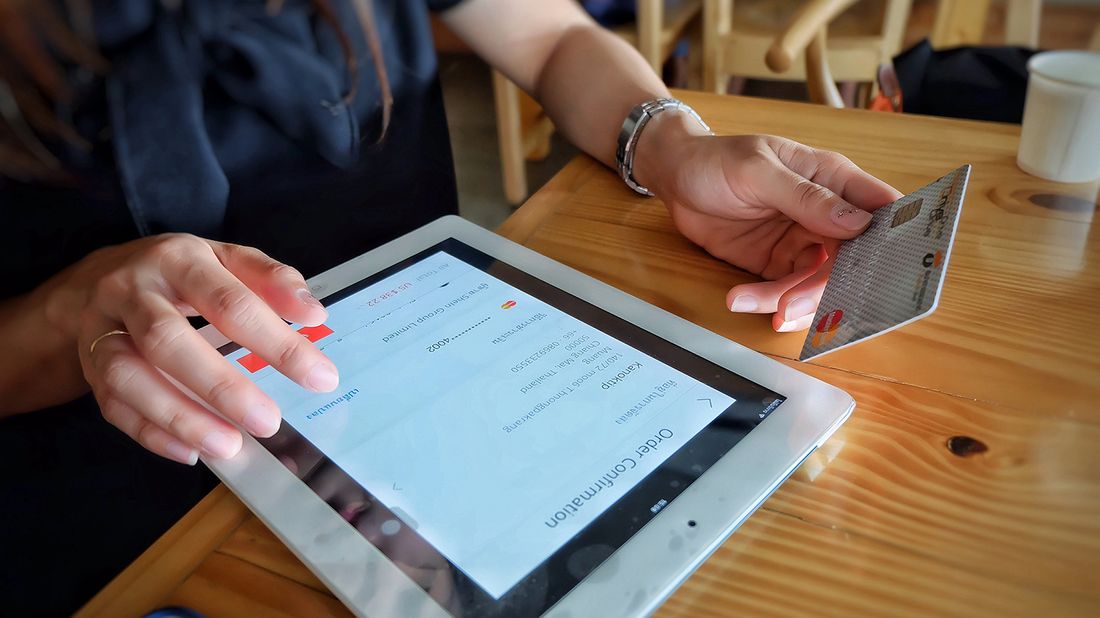Trying to Pay Off Credit Card Debt? Then Stop Doing These Things First

So you're finally getting serious about your credit card debt. That probably means you've started paying more than the minimum due each month in order to whittle your balance down to zero faster. Congratulations! You’ve made a first step in the right direction.
But a good payoff plan is about more than just throwing money at debt. It also includes knowing what kinds of credit pitfalls to avoid so that you aren't slowing down — or even reversing — your progress.
Not sure what we mean? We've outlined some of the biggest mistakes people make while trying to pay off credit card debt — plus advice for avoiding these common credit traps.
1. USING CREDIT CARDS TO PAY FOR EVERYTHING
This is a big one, because it can be second nature to a lot of people to reach for their plastic, whether they're paying for a week's worth of groceries or a pack of gum. But it's twice as hard to pay down your balances when you keep adding to them each month.
The problem is that when you pay for every purchase with plastic, it's more difficult to keep track of your spending. Then you're stuck with a credit card bill at the end of the month that you can't pay off in full.
The best ways to tackle this problem? For starters, set a budget (one that accounts for fixed and flexible expenses, as well as contributions to goals like retirement or paying off debt) so that you aren't spending more than what you're bringing in each month.
Then make it harder on yourself to ring up your credit cards. By that, we mean tricks like unlinking your card from online accounts (Seamless, we’re looking at you), unsubscribing from flash-sale emails or even rerouting your daily commute to avoid passing your favorite coffee or takeout spot. And if all else fails, literally freeze them by putting them in water at the back of the freezer.
2. TREATING YOUR CREDIT CARD LIKE AN EMERGENCY FUND
One of the consequences of having zero emergency savings is that when a bum transmission or chipped tooth strikes, you have to turn to your credit card to bail you out.
That's why it's important to build up at least one month’s worth of take-home pay in a rainy day fund before you even start aggressively tackling your credit card debt. Once you hit that mark and are making progress on your debt, you should continue to build up your emergency savings to about six months' worth of expenses. That way, when the next surprise expense pops up or you temporarily find yourself without an income, you’ll have funds ready to dip into instead of turning to a credit card.
3. PAYING OFF TOO MUCH TOO SOON
Yes, you read that right. While it may seem counterintuitive, you could wind up hurting yourself and your finances by throwing too much toward your balances — if you don't leave yourself enough cash for other necessary expenses, like food and rent.
Having to rely on your cards again after leaving yourself cash poor is called the "pay-spend-pay" cycle. The key to avoiding this trap is making sure that your debt payments are at a level that you can reasonably afford and that leaves you with enough to cover your other expenses and savings contributions.
4. PAYING OFF DEBT WITH DEBT
When you have multiple credit card balances vying for your attention, taking out a separate loan to pay them off so you have just one monthly payment can seem like a simpler and more efficient practice. The problem, however, is if you haven't addressed your spending habits, seeing a zero balance may tempt you to run up your credit cards again.
Another potential downside is that even if you're getting a loan with a lower interest rate than your credit cards, your new monthly minimum payment may be higher than what you can afford, leading to the pay-spend-pay cycle again. So if you do decide to go this route, it's important to read the fine print and know both your interest rate and your expected minimum payment due each month.
5. USING CREDIT CARD PERKS AS AN EXCUSE FOR SPENDING
Another day, another offer in the mail for a credit card that has better perks than the ones you have. But before you succumb to that new offer, it's important to figure out whether those benefits really will benefit you.
Take balance transfer offers. As with loans, a 0 percent balance transfer can work to your advantage when used responsibly — but not if it's a quick fix to free up your credit, only to run it up again. In addition, these offers come with a lot of fine print that could end up doing more harm than good.
For instance, if you haven't paid off your card by the time the 0 percent introductory offer expires, the credit card company could capitalize whatever interest you would have owed onto your remaining balance. This could ultimately cost you more than if you'd never transferred the balance, depending on what your new APR is.
And if you are attracted to cards that dangle rewards points, miles or cash back in front of you, think about what the trade-off will be. For example, paying 23 percent interest on a balance you can't pay off isn't worth the 3 percent cash back.
Feel better about taking action on your dreams.
Your advisor will get to know what’s important to you now and years from now. They can help you personalize a comprehensive plan that gives you the confidence that you’re taking the right steps.
Find your advisor




